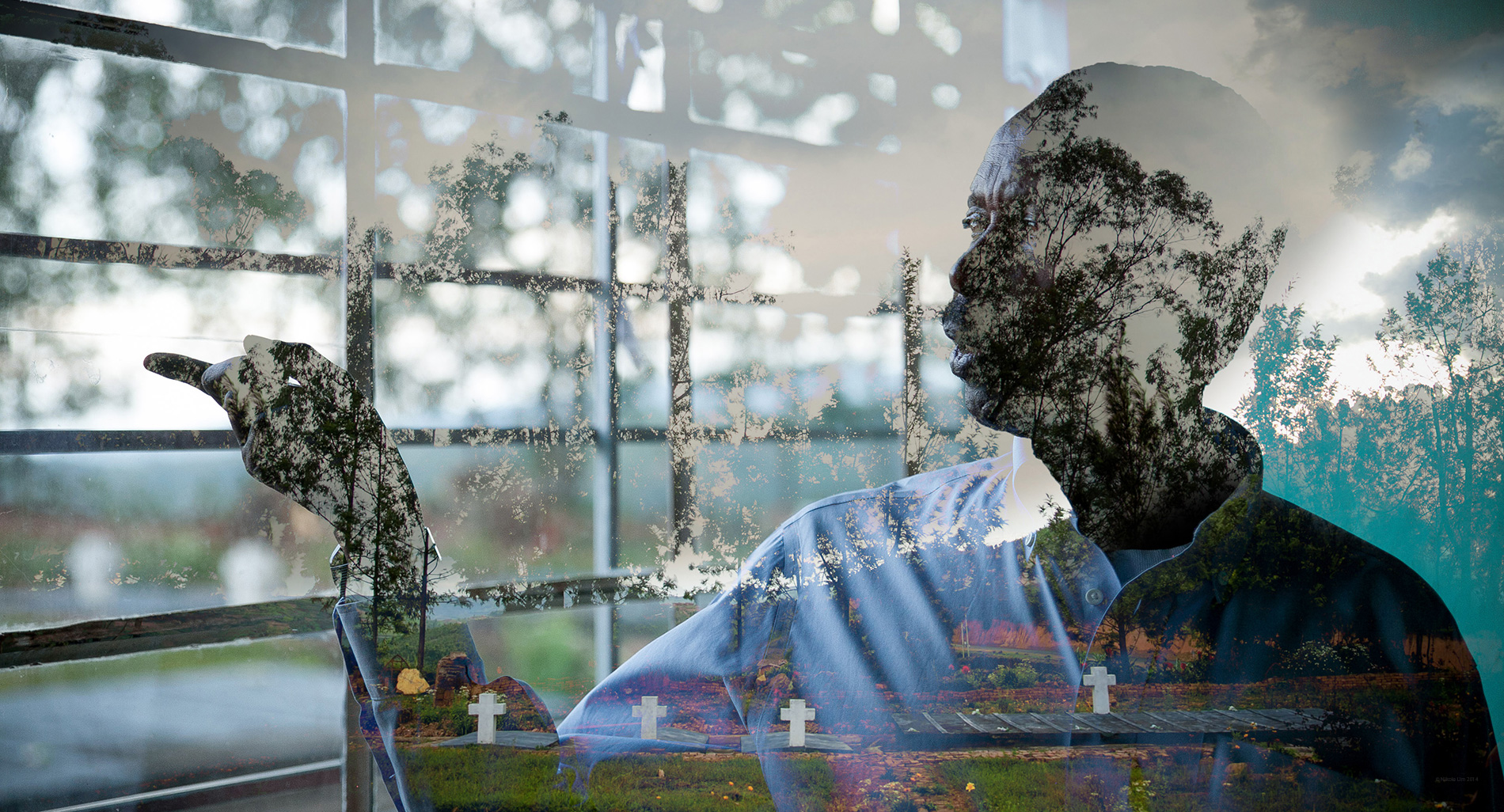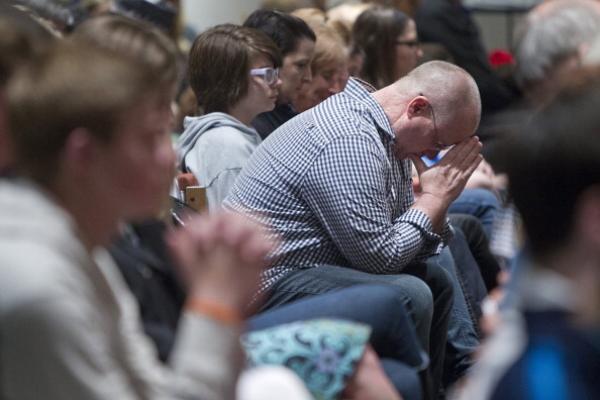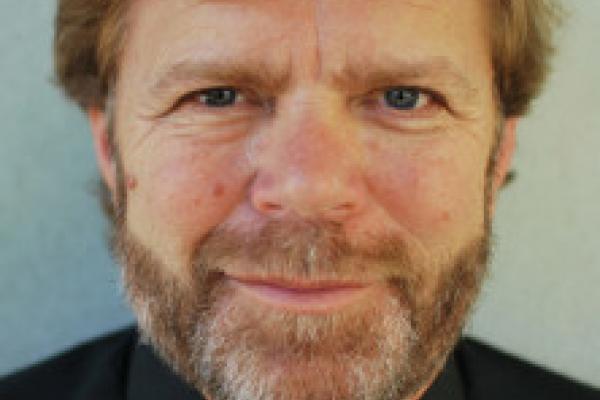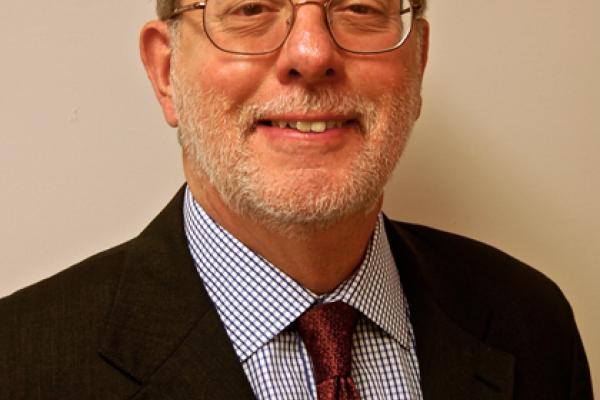
Next to a glass casing displaying neatly stacked skulls, Rwamasirabo flipped through the pages of a dusty notebook holding the church’s paperwork. He pulled out a church program. On it, was a photo of his former friend, Father Athanase Seromba, a 31 year-old Roman Catholic priest who was responsible for killing 3,000 of his Tutsi congregation members. The priest wore a black oxford with a white clerical collar accessorized with a distrusting mustache and a toothy smile seething betrayal. Rwamasirabo stuffed the program back into the notebook.
Rwamasirabo’s thin stature commands respect and the lines in his face convey tragic sorrow. His careful, soft-spoken voice expressed feelings of loss. With worn hands, Rwamasirabo searched through a pile of salvaged rubbish to find the chalice from which communion was served.
It reminded him of his daughter.
The violence of hatred breaks our hearts. This past weekend in my neighborhood of Overland Park, a shooter killed three people and injured others. My church sits a mile from the sites, and members of my parish know the families of the victims. We are in the process of responding, holding vigils and praying, seeking to comfort one another and make sense of this hateful thing.
I know two ways souls respond to such hate. In one, the heart hardens against the violence, protecting itself. In the other, the heart weeps, leaving itself open to be broken again.
The first way can seem so right. There is a dark logic in giving our hearts permission to loathe the one who could go to so terrible a place, and arm himself to take lives randomly with gunfire. There is a sort of helpless security in burying our hearts away from the reports of such violence. If this gives up some piece of our humanity, at least it keeps our hearts from feeling such pain again.
Yet I have to believe in the other way, leaving my heart open to the world, though it will be broken again and again. In part, this is because I know that claiming permission to hate one man makes way for hating others, and then hating them by groups and by labels, until perhaps one day I wouldn’t care if they lived or died.
At Easter, Christians celebrate Jesus’ rising from the dead. But in light of new revelations of the CIA’s abhorrent acts of torture, it’s the United States that needs resurrection, too.
Details of the CIA’s post-Sept. 11 torture campaign — made worse, if that is possible, by evidence of official deception — are described in key portions of the report on CIA-sponsored torture that the U.S. Senate Intelligence Committee voted last week to release.
Though the public has not yet seen the report, current and former U.S. officials who have read it have disclosed information to The Washington Post, Human Rights Watch, and other sources that ought to disturb all of our consciences.
On Thursday evening, in a familiar reprise of an ancient rite, Bishop Robert Morlino of Madison, Wis., will wash the feet of 12 men, all seminarians — a re-creation of Jesus’ action at the Last Supper when he washed the feet of his disciples and, according to Catholic doctrine, formally instituted the priesthood.
That same evening, thousands of miles away, Pope Francis will also observe the Holy Thursday rite, though not in a cathedral like Morlino but at a center for people with disabilities. There he will wash the feet of a number of residents, all lay people and perhaps some of them women and even non-Christians or nonbelievers.
Francis did something similar last year, shortly after his election, when he stunned church observers by traveling to a juvenile detention center outside Rome and washing the feet of 12 young people, two of them women and two of them Muslims.
As latter-day partisans fling terms like “dictator” and “Nazi,” I decided to read William Shirer’s classic book about the real thing.
In “The Rise and Fall of the Third Reich,” the historian describes Adolf Hitler as a sad little man — a layabout and chronic failure — who discovered his larger-than-life quest, convinced himself he was above all normal constraints and found the combination of scapegoating (blaming Jews and Slavs for Germany’s woes) and delusion (grandiose master-race theory) that would justify trampling on lesser lives.
We love a good parade, don’t we? All that celebration, the noise, the crowds, the jubilation … It’s exciting and contagious and a little amazing how a good parade can impact us.
No one understood this like the Romans. These are the people of bread and circuses after all, and no one in the ancient world did empire better than the Romans. The Romans were incredibly good at subduing those people they had conquered. They celebrated the festivals of, raised up leadership from, and generally ingratiated themselves smoothly into the lives of those they ruled. But rule they did.
There certainly were people in Jesus’ time who thought Jesus’ work would be to overthrow the Roman oppressors — establish a political kingdom. Scholars surmise that Judas, the disciple who would betray Jesus to the empire, was one of these. Think of Judas as someone who saw the evils of the Roman Empire and desperately wanted Hebrew rule returned to the region. What we might today call a freedom fighter.
But throughout his ministry, Jesus talked explicitly about the Kingdom of God, the Kingdom of Heaven that is not of this world but is omnipresent, always at hand, constantly among us. And God’s. Period. A very different image of kingship, of dominion.
Could a series of “blood moon” events be connected to Jesus’ return? Some Christians think so.
A string of books have been published surrounding the event, with authors referring to a Bible passage that refers to the moon turning into blood. “The sun shall be turned into darkness, and the moon into blood, before the great and terrible day of the Lord,” Joel 2:31 says.
Interesting fact: The term “breaking bread” goes back many centuries and crosses many cultures and religions. It’s a shared term for coming together in meal and friendship. The term applies today — you can find it in some urban dictionaries.
For as long as we’ve been around, we’ve come together and connected over a meal. We enjoy breaking bread and telling stories, restoring friendships, and creating new ones.
Bread has been a staple of diets for a long time, so it’s a natural choice to capture the essence of eating together. Also, it’s wonderfully symbolic. When we break bread, each of us gets one piece of a bigger loaf. It feeds our sense of connection.
It’s not surprising that bread-breaking is a touchstone religious practice. For instance, it’s part of Jewish tradition. Two thousand years ago, a Jewish rabbi chose it as a way for his followers to remember their unity.
Jesus spent the last years of his life teaching that everyone is responsible for everyone else and must live that way — feed the hungry, give drink to the thirsty, heal the sick, visit the imprisoned, care for the poor. Breaking bread is a reminder that our lives are about more than ourselves.






